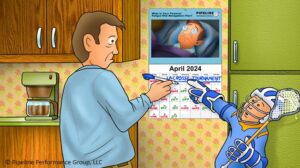Have you ever walked out of your house, forgot to bring your cell phone with you, and nearly panicked at the thought of leaving without it? Considering iPhones have been on the market only about ten years, it seems remarkable that we could have become so attached to our devices so quickly. Our phones do provide a measure of protection for us since we know we can use them to make emergency calls from any location. For that reason alone, most of us feel safer when we have them within arm’s reach.
Controllers and others spend 8 to 12 hours a day monitoring information produced through digital information systems. If you add personal time spent on social media, news, sports, and communication, your screen time can easily accumulate. Being connected and immersed in the digital world is part of everyday life in the 21st century. And now that we’re in the midst of a global pandemic, media interaction has become mandatory for most of us.
When we choose a digital detox, we refrain from using our devices such as smartphones, televisions, computers, tablets, and social media sites. Detoxing from digital devices provides new opportunities for interacting with family and friends, without distraction. Time away from our devices is a way to reconnect with “real life” and the people we care for. Won’t it be refreshing to enjoy personal connection again, after the current crisis has passed?
Change your focus, if only for a few minutes. Go outside and experience the warmth of the sun. Notice nature, or take a walk to give your mind and body a health-filled reset. Exercise, especially when done outdoors, is a proven stress reliever. Even sitting quietly outside gives you a chance to release tense and restless thoughts. By putting our devices away for a while, we can more easily let go of the stress that comes from constant connectivity. Disconnecting from the constant stimuli provided by the digital world gives the nervous system a chance to “power down” and rebalance. Chances are very good that you’ll sleep more soundly as a result of your detox efforts.
The World Health Organization (WHO) recently recognized that addiction to digital media, and video games in particular, has become a serious health problem. In 2018, WHO classified ‘gaming disorder’ as a mental health condition and it is now included in the International Classification of Diseases Manual.
The American Psychiatric Association revealed that the brain develops certain pathways, like the brain of a person addicted to gambling or drugs, in response to the constant activity. Symptoms of attention deficit hyperactivity disorder (ADHD), including impulsivity, may develop or become more pronounced as a byproduct of these addictive behaviors. This makes it difficult to control the obsession. Taking time away from digital devices is the only way to break or avoid the addiction.
One of your fatigue mitigation strategies is to use your off-duty time for adequate rest. Could a digital detox contribute to the rest your mind and body need for a better night’s sleep? Disconnect all electronics before preparing for sleep to allow your mind to begin the process of relaxation. Choose to designate a certain amount of time each day to put away your electronic devices and connect with people, places and things. You’ll be glad you did.
MANAGING FATIGUE EDUCATIONAL PROGRAM | Scarlet Knight © 2020 Please Distribute to Others.




